Everything You Ever Need To Know About Broccoli (Drew's Digest #07)
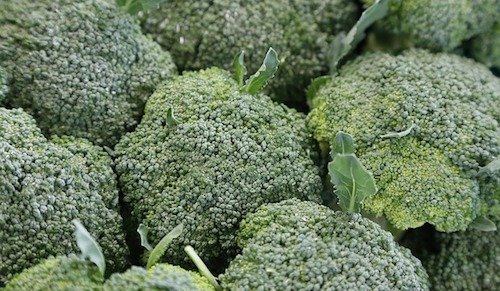
Where do they come from?
The polarising broccoli is believed to have originated in the Mediterranean and Asia Minor regions. It was first cultivated in Italy more than 2000 years ago, where it became a highly popular vegetable before spreading to France and across Europe where it was finally introduced to England in the 18th century.
American Founding Father and third President of the United States, Thomas Jefferson, was an avid gardener and imported broccoli seeds from France (along with other vegetables) but it remained somewhat exotic and wasn’t really grown commercially in the United States until the 1920’s.

source
What is it exactly?
Broccoli is a cruciferous vegetable, meaning it is part of the cabbage family and is therefore related to other vegetables like cauliflower, brussels sprouts, broccolini and broccoflower (cross between broccoli and cauliflower).
The name broccoli comes from the Italian version ‘broccolo’, which was derived from the Latin word ‘brachium’ meaning arm or branch. Broccoli is simply an edible flower head, surrounded by leaves and a strong thick stalk (looks like a little tree). The most common variety has a bright green head but can vary from dark green to purple depending on the variety.
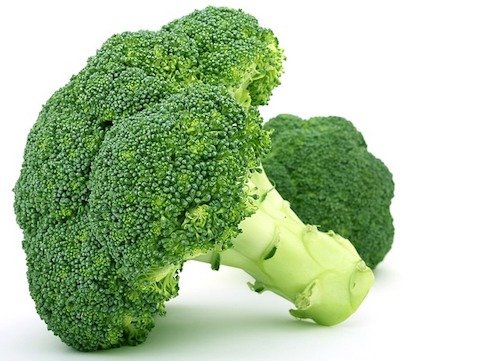
When is it available?
In Australia, it is grown mostly in Victoria and Queensland and in season from April through October, although it is available all year round (sometimes from frozen imported produce). Most countries consume a fair amount of broccoli but the two biggest producers of broccoli are China and India.
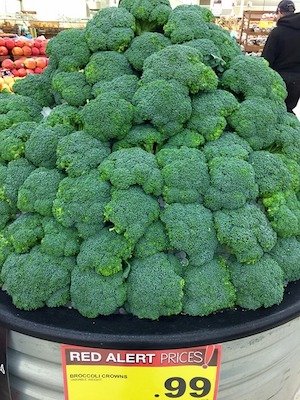
How do I choose and store it?
When choosing broccoli, looks for ones that feel heavy, have a solid stalk and firm/tight green florets. Don’t buy any that have yellow leaves or have soft, loosely packs florets.
To store fresh broccoli, wrap in a damp paper towel and place in the refrigerator. It is not recommended to store broccoli in plastic bags or containers, as they need to breathe a little.
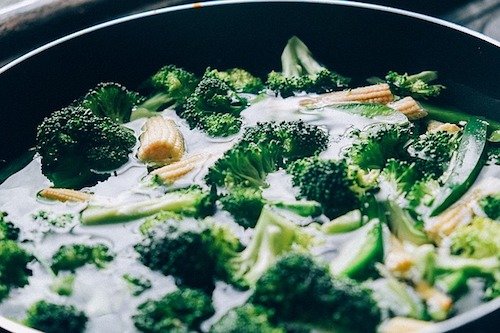
Broccoli can quite easily be frozen for later use as well. When they are in season they become super cheap and abundant, like any other fruit or vegetable. The best method for freezing requires a little bit of cooking, either by blanching or steaming. First, chop the florets into 1-inch pieces. Stalks can also be partially cooked and frozen (or you can throw it in a freezer bag with other vegetable off-cuts to make a vegetable stock later on).
Blanching – Put broccoli pieces in boiling water for 2 minutes.
Steaming – Put broccoli pieces in a steaming basket or bamboo steamer and let them cook from the steam for 5 minutes.
(Tip: Putting some lemon juice in the steaming water will make the broccoli stay bright green).
How do I use it?
Before you eat broccoli or any non-organic fruit or vegetable for that matter, it is best if you wash it in some sort of acidic solution.
“Why?”
Pretty much everything that isn’t classified as “organic” has some degree of pesticides sprayed on it to prevent insects, molds and other things (well…pests) from growing or feeding on it. That being said, even organics can be sprayed with pesticides so you may as well wash everything.
There are a lot of studies out there on the negative effects that pesticides have on human bodies, but let’s just stick with broccoli for now. Things like broccoli have lots of little crevices for critters and chemicals to linger in and washing them in some sort of acidic solution has shown to dramatically reduce the number of insects, pesticides and impurities that remain in the plant, compared to a standard water wash. Some use a ratio of 1 part white vinegar to 3 parts water; or 1 teaspoon salt to every cup of water. Soak for 2 minutes or so and then run under clean water to remove the salt or vinegar, before patting dry with paper towel.
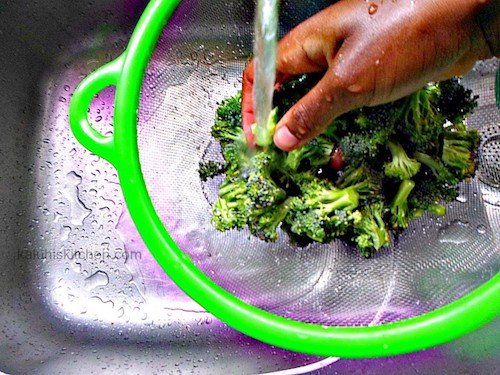
source
The simplest method to cook broccoli, whilst retaining the most nutritional value, is to lightly steam it for no more than 3 minutes. It can also be roasted in olive oil along with some chilli, garlic, salt and pepper (or whatever suits your fancy), and it is great in stir-fries.
If you choose to boil broccoli, be aware that the longer it boils in water, the more water-soluble vitamins are lost and all those nutrients that you wanted end up getting washed down the drain. (Basically, the longer anything is cooked, the fewer nutrients it retains. However, there are some exceptions).
Did you know?
According to the Guinness World Records, in 1993 an Alaskan man set a new world record for the heaviest broccoli. How heavy you ask?
15.87 kg (35 lbs)… That’s the weight of an average 3 yr old!
Why should I eat it?
Broccoli, like most green vegetables, is packed with Vitamin K and C and also high in fluoride which is important for bone and teeth mineralisation.
Half a cup of cooked broccoli contains:
- 2.6 grams of fibre (~ 10% RDI) = helps in lowering cholesterol, aids in digestion and maintains low blood glucose levels
- Around 100 mg of omega-3 fatty acids = has an anti-inflammatory response
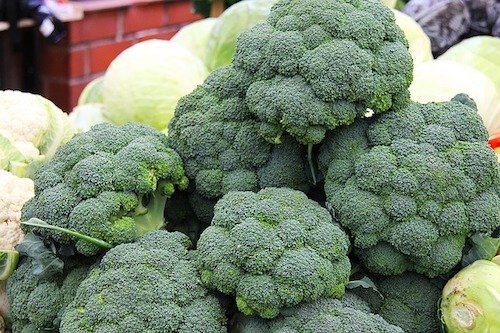
Other benefits of eating broccoli regularly include:
lowering risk of cancer development
- certain chemicals such as sulforaphane and it’s glucosinolate precursor, glucoraphanin, that are present in cruciferous vegetables have anti-carcinogenic properties.indirect antioxidant activity
- it is rich in isothiocyanates, which are antioxidants that assist in ridding the body of free radicals (extra info about antioxidants and free radicals is available here).promoting eye health
- high in carotenoids, zutein and zeaxanthin (like avocado) which support eye and skin health by reducing the damaging effects of UV light on the retina and skin.
Broccoli sprouts are also common because they are super high in all the chemicals, vitamins and minerals listed above. But they are hard to find in stores and require you to grow them at home.
Images are my own, sourced from Pixabay or linked
Drew's Digest #06 - Five Hidden Sources of Vegan Protein 💪
Drew's Digest #05 - Everything You Ever Need To Know About Lemons 🍋
Drew’s Digest #04 - Vitamin K: The Blood Clotting Compound 🥒
Drew’s Digest #03 - Everything You Ever Need To Know About Pomegranates 😍
Drew’s Digest #02 - How Genetics Will Define Our Future Diets 👨🏻🔬
Drew’s Digest #01 - Everything You Ever Need To Know About Avocados 🥑
CONNECT WITH ME ON

I gave you some lovin How bout you give me some too?
This is such a great, well written post! Broccoli is one of my favorite vegetables, it’s so good for you too! Thank you for sharing @thedrewtrott!
Thank you for the upvote, yeah I absolutely love writing these types of articles. Helps me get a much needed refresher and provide the community with a little more nutritional ammunition. ✊
I don't like broccoli much, it's a vegetable that I don't mind eating but I also don't like it very much ...
But I have already seen that it is very good for our health, I will try to start liking a little more of them!!
Nice post.
Try and find new ways to cook them. You won’t love them overnight, but they will slowly start to grow on you. Try them roasted and put in a salad 🌿
Thank you so much, I'll try your advices!!
Brocolli Soup or brocolli pesto are great ways to eat it too I find. The pesto is great for kids.
This post has received a 10.27 % upvote from @aksdwi thanks to: @thedrewtrott.
Knocking it out of the park there @thedrewtrott even my Rottweiler and my Nottweiler love brocolli. They are fiends for it.
Keep up the great work.
Thank you for this valuable information... good job!
It is my fevorite vegetable.
@originalworks